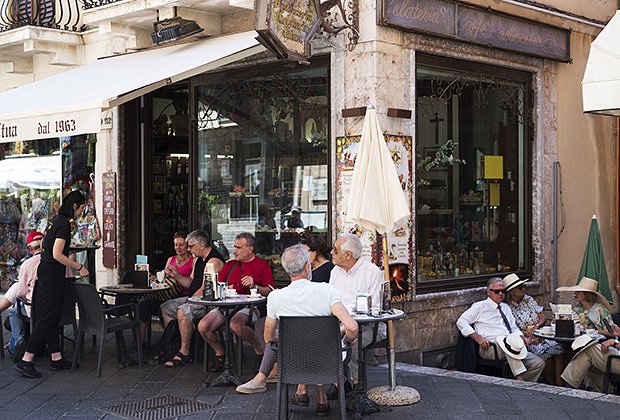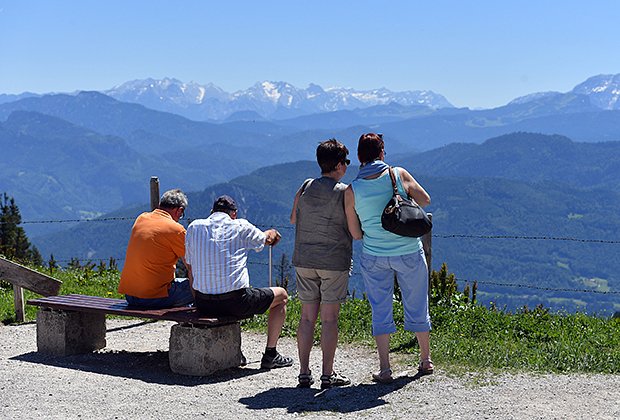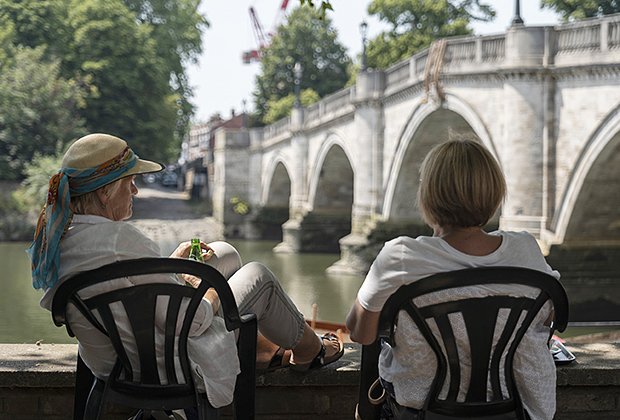The Russian visited Sweden and described pensioners with the phrase “with a young vibe”
Most older people in Europe begin to live for themselves when they retire. While Russian grandparents help their children with their grandchildren and tend to their gardens, foreign pensioners travel to different countries, take care of their health, and generally fulfill their long-time dreams. This often causes many reasons for envy among Russians. Lenta.ru found out why travelers are so surprised by the lives of retirees in the West.
“Retirees in Europe buy motorcycles to rejuvenate”
In May, a Russian travel blogger visited Europe and described it with the phrase “I want old age, like theirs.” The girl noted that the first thing she noticed was the lack of vegetable gardens among pensioners in European countries.
Personally, I am not close to the ideology of my grandmother, who literally “plows” the garden from the end of spring until the fall, so that everything is her own
Previously, she stated that another feature of mature Europeans is that they live for themselves. The blogger noted that it is not in their culture to help children financially, as is the case in Russia. She also noticed that pensioners often spend time with friends, go to cafes and beauty salons, and do not babysit their grandchildren.
Photo: Raquel Maria Carbonell Pagola/LightRocket via Getty Images
In addition, to feel better and younger, both men and women are switching from comfortable cars to bicycles. This way they become more mobile. Some people in Western countries even buy scooters and motorcycles to rejuvenate themselves.
“Russians call British pensioners slackers”
“In 2022, an extraordinary number of older people from Russia arrived in the UK. All of them were cut off from their usual life, many still miss their homeland very much. That’s why ten months ago I opened the Superstar organization for Russian-speaking pensioners who live in England,” its founder Alena Muchinskaya tells Lenta.ru. — There are already 100 people in it. We are now preparing to celebrate our first anniversary. My youngest ward is 65 years old, the oldest is 91 years old. I am glad that our initiative came to fruition. We organize various meetings, lectures, concerts, book clubs, and film discussions for pensioners, not only in person, but also via Zoom.”
According to Muchinskaya, first of all, Russian pensioners differ from British ones in their mentality. In Russia, grandparents are often left to raise their grandchildren. It won’t work with older people in the UK, she’s sure.
They will definitely help their children, but they will only do it from 8 to 10, because at 11 they go to yoga. I can hardly imagine that some of our Raisa Petrovna would answer her son like that
“I can’t call it selfishness,” added the compatriot. “I think older people should do this.” They have lived a long life, raised children on their own feet, and can finally begin to enjoy it. Some of my clients support this British lifestyle. However, there are those who call them slackers.”

Photo: Tim Graham/Contributor/Getty Images
Muchinskaya emphasized that British pensioners have no problems when it comes to medicine. All services are provided to them free of charge. Moreover, if a person is sick, social workers are sent to him and take care of him in every possible way. And such a system operates not only in the capital and large cities, but throughout the country.
Elderly Britons are provided with expensive beds that can be raised and lowered and given wheelchairs. London has amazing opportunities for traveling in wheelchairs: there are ramps everywhere, easy access to the subway, and lowering steps on buses.
At the same time, in the UK, as Muchinskaya pointed out, there are not even close social projects such as “Good Bus” (within the framework of which Russian pensioners can visit the historical sights of Moscow and the Moscow region, museums, operating enterprises and more) and “Moscow Longevity” (the largest health, educational and leisure project for older residents of the capital).
“Pensioners in England love to travel,” the Russian woman added. “And sometimes they even get discounts on travel. But they still have to be paid for, and such pleasure is not cheap at all. Therefore, they try to save up some money to see the world and fulfill their dreams.”
“The Swedish pensioner acted like a teenager”
Travel blogger and traveler Ruslan Khosroev, in a conversation with Lenta.ru, said that during a trip to Sweden he rented an apartment from a 65-year-old man. “He is retired, lives alone, and has two adult sons,” the Russian continued. — The man was very energetic and interested. By the way, during that period he began to study Turkish. He shared with us that he often flies to this country and is generally delighted with it.”
The traveler believes that, unlike older people in Russia, Europeans have a very broad outlook and great intentions. Due to this, they are more free, flexible and open to the world.

Photo: Joerg Koch/Getty Images
“It was very noticeable that this Swede had a young vibe,” Khosroev pointed out. — Immediately after we met, he subscribed to us on social networks. When meeting, he constantly joked and teased. Even in his old age he acted like a teenager, or at least he tried to.”
In Russia you become more and more serious every year, but in Europe it’s the other way around. They don’t bother about it
“Italian pensioners are spending their old age in Portugal”
Compatriot Alina, who lives in Europe, in turn, noticed that the behavior of older people in Italy depends on the region where they live.
“Pensioners in the south of the country are somewhat similar to Russians. They are strongly focused on the family, the main joy of their life is to take care of their children and grandchildren,” she said in a conversation with Lenta.ru. “Elderly people who live in the northern part of Italy are colder and more reserved. They do not have such a strong attachment to relatives.
The Russian woman noticed that young girls in Italy are not very well-groomed, which cannot be said about older women. They don’t leave the house without styling and makeup. You can also often see them sitting in large groups on the verandas of restaurants in fashionable outfits.

Photo: Sam Mellish/Contributor/Getty Images
The girl emphasized that Italians do not receive a very large pension and at the same time pay huge taxes. Therefore, many elderly people often go to Portugal, where they have pension benefits, and spend their old age there.
Some older Italians go to their villages, grow olives or grapes there, and make oil and wine. Very old people sit at home, and their children hire caregivers for them
The highest pensions in Europe
According to Eurostat data from 2021, the largest pension in Europe pay V Iceland. Elderly people in this European country receive about 2,762 euros per month. In terms of rubles, this is approximately 265 thousand. At the same time, the average monthly salary in Iceland is 6,828 euros per month.
In second place in terms of pensions is Luxembourg. Every month, pensioners living in this country receive an average of 2,575 euros (250 thousand rubles), and the average salary is 6,658 euros.
The third line is gone Norway. Elderly people in this Scandinavian country can count on a pension of 2,438 euros per month (237 thousand rubles), while the average salary in the country is 6,208 rubles.
Next in the ranking is Denmark. Local authorities create favorable living conditions for pensioners and pay each of them approximately 2,417 euros (235 thousand rubles), with an average monthly income of 5,247.
Closes the top five in terms of pensions Switzerland with an indicator of 2138 euros (207 thousand rubles), and the average income here is considered the highest in Europe – 8903 euros per month per person.
The top 10 ranking also included Austria (1962 euros – about 190.1 thousand rubles), Netherlands (1931 euros – 190 thousand rubles), Ireland (1906 euros – 187 thousand rubles), Sweden (1838 euros – 178 thousand rubles) and Belgium (1737 euros – 170 thousand rubles).
“A measly 300 euros looks like a joke”
At the same time, there are countries in Europe in which, on the contrary, they envy Russian pensioners. So, Russian travel blogger reported, that this number includes elderly people from Lithuania. According to him, pensioners are Lithuania’s weakest point. The traveler indicated that the average Lithuanian pension is 300 euros (about 30 thousand rubles).
It seems like a lot, but when you see the local price tags, which are five times higher than in Russia, you understand that a measly 300 euros look like a joke
“I recently called up a classmate, also Russian, but lives in his homeland, we compared pensions, compared prices,” the compatriot continued. – I get 370 euros, a loaf of bread costs one and a half, it turns out that I can afford 245 loaves, Sashka in Rostov receives 18,800 rubles, loaves worth 30 rubles can get 630 pieces. This is a clear difference in the well-being of our countries.”
#age #Russians #amazed #pensioners #life #enviable